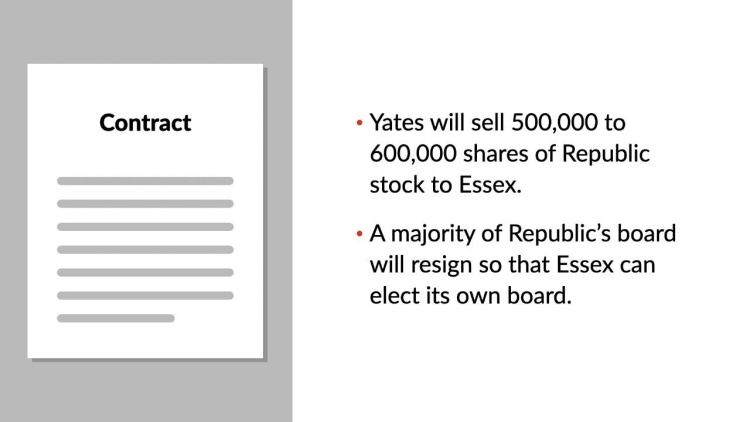Essex Universal Corporation v. Yates
United States Court of Appeals for the Second Circuit
305 F.2d 572 (1962)

- Written by Sean Carroll, JD
Facts
Herbert Yates (defendant) was president and chairman of the board of directors of Republic Picture Corporation (Republic). Yates agreed to sell stock to Essex Universal Corporation (Essex) (plaintiff) in the amount of 28.3 percent of Republic’s outstanding shares. Republic had over 1,500 shareholders, and in a corporation of that size, such a large percentage of stock (28.3) is equivalent to owning share control. The stock-purchase agreement called for the immediate transfer of control of the board through a resignation of the majority of Republic directors and the election of directors of Essex’s choosing in their place. Ordinarily, only one-third of Republic’s directors were elected at each annual meeting, and thus Essex under normal circumstances would not have been able to take managing control officially until about 18 months after the sale, when it had elected enough of its own directors. When the time came for Essex to tender payment to Yates, however, Yates said that he did not want to go through with the deal. Essex brought suit. The district court granted Yates’s motion for summary judgment in that the clause in the agreement that called for the immediate transfer of control of the board was illegal per se. Essex appealed.
Rule of Law
Issue
Holding and Reasoning (Lumbard, C.J.)
Concurrence (Clark, J.)
Concurrence (Friendly, J.)
What to do next…
Here's why 907,000 law students have relied on our case briefs:
- Written by law professors and practitioners, not other law students. 47,100 briefs, keyed to 996 casebooks. Top-notch customer support.
- The right amount of information, includes the facts, issues, rule of law, holding and reasoning, and any concurrences and dissents.
- Access in your classes, works on your mobile and tablet. Massive library of related video lessons and high quality multiple-choice questions.
- Easy to use, uniform format for every case brief. Written in plain English, not in legalese. Our briefs summarize and simplify; they don’t just repeat the court’s language.





